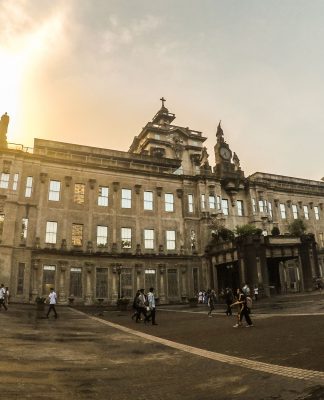HIS PASSION and dedication to natural and applied science made have him one of the most respected scientists in the country today.
True enough, Assistant to the Rector for Research and Development Dr. Fortunato Sevilla III was named by the Professional Regulatory Commission as Outstanding Chemist for 2002. His sterling career in research and the academe has been recognized here and abroad, bringing fame to UST.
Sevilla started as an instructor at the Chemistry Department of the College of Science in the early ‘70s. He fondly recalls his student days when he would always represent the University in interschool Chemistry competitions, emerging as the winner. After he graduated from Chemistry Summa cum Laude in 1968, he pursued graduate studies at the University of Manchester in the United Kingdom, focusing on Instrumentation and Analytical Science.
“The best thing I learned in UST is perseverance and keenness to details which I was able to apply throughout my stay in Europe,” said Dr. Sevilla, who also became a visiting professor at the Universitat Autonoma de Barcelona in Spain. According to him, a person’s character and values will always be reflected in his job.
From his previous post as director of the UST Research Center for Natural Sciences (1987-2000), he served as president of the Federation of Asian Chemical Societies (1995-1997), Philippine Federation of Chemical Societies (1996-1999), Integrated Chemists of the Philippines (1990-1995), Chemical Society of the Philippines (1990-1995), and the National Research Council of the Philippines (1996-2000). Fr. Rector Tamerlane Lana, O.P. already signed his appointment as the next Dean of the College of Science after Dr. Gloria Bernas’s term expires this July.
Research culture
Dr. Sevilla stresses the importance of building a research culture in the university. According to him, one of the reasons of UST’s low profile is because of its poor utilization of research. Although most professors in the allied sciences (Engineering, Medicine, Pharmacy, Nursing, Rehabilitation Science, and Science) have MS and Ph.D’s attached to their name, only a handful are into research collaborations in the university. When the Thomas Aquinas Research Complex went operational last year, most of the researchers booking its facilities came from other universities.
Sevilla notes that Thomasians from other prominent universities are the ones making a mark in those universities, prompting him and the academic community of UST to spearhead research linkages to connect them to the university’s output.
“We have a lot of graduates making big names in other universities. If we can gain their loyalty and confidence back with TARC on our side, then UST will be back to its pedestal as the premier research institution,” Sevilla said.
He also emphasized that more alumni are starting to recognize the university’s research record, showing signs that they would like to work with UST given the opportunity.
“Students are the key determinants of excellence. We should strive to keep them abreast with the challenges of the modern world by providing them not only with the knowledge but also the know-how for using it,” he said.















